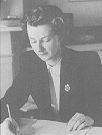| Search MusicWeb Here | ||
 |
||
|
Founder:
Len Mullenger (1942-2025) Editor
in Chief:John Quinn
|
Chandos have released two recordings of the music of Doreen Carwithen (Mary Alwyn).
The first disc of orchestral music was issued in March 1997 (CHAN 9524) and a second disc in March 1998 (CHAN9596) and features the Sonata for Violin and Piano Lydia Mordkovitch (violin) and Julian Milford (piano) and the two String Quartets performed by the Sorrel Quartet.
 Doreen Carwithen was born
in 1922 at Haddenham, Bucks. and comes from a musical family Her mother -
a music teacher - gave her her first lessons on the piano and violin at the
age of four, and continued teaching her the piano until she entered the Royal
Academy of Music as Bucks. County Scholar in 1941. She also had cello lessons
with Peers Coetmore and, while still at school, played the cello with a regular
string quartet and in local orchestras. Apart from these the only music she
heard came from the radio - the family did not have a gramophone, so she
was dependent on the BBC for her knowledge of orchestral music. As it was
wartime this was limited to concerts on the Home Service, but these led her
to learn score-reading so as to gain insight into the orchestral sounds -
a facility which proved invaluable in her future career.
Doreen Carwithen was born
in 1922 at Haddenham, Bucks. and comes from a musical family Her mother -
a music teacher - gave her her first lessons on the piano and violin at the
age of four, and continued teaching her the piano until she entered the Royal
Academy of Music as Bucks. County Scholar in 1941. She also had cello lessons
with Peers Coetmore and, while still at school, played the cello with a regular
string quartet and in local orchestras. Apart from these the only music she
heard came from the radio - the family did not have a gramophone, so she
was dependent on the BBC for her knowledge of orchestral music. As it was
wartime this was limited to concerts on the Home Service, but these led her
to learn score-reading so as to gain insight into the orchestral sounds -
a facility which proved invaluable in her future career.
In 1947 J. Arthur Rank started an Apprenticeship Scheme for composers to specialize in the study of film music. Carwithen was the first from the R.A.M. to be selected for this and she subsequently wrote scores for over thirty films. Her documentaries ranged from Teeth of the Wind, a study of locusts to the official film of the coronation - Elizabeth is Queen. Among her feature films are two in which music takes the place of dialogue - The Stranger Left No Card and On the Twelfth Day. The Stronger Left No Card received The Cannes Festival award for the best short, fictional film, and was then shown at the Edinburgh Festival.
1947 also saw the selection of the overture ODTAA as the first new score to be chosen by the London Philharmonic Orchestra Music Advisory committee. ODTAA had its first performance at Covent Garden in March 1947, conducted by Sir Adrian Boult. It was a great success and many performances and broadcasts followed, particularly in the north of England. Bishop Rock (1952) was chosen by Rudolf Schwarz to open the City of Birmingham Orchestra's season of Promenade Concerts. The same year saw the first public performance of the Concerto for Piano and Strings at the Henry Wood Promenade Concerts, where she was the only woman composer to be represented in that season.
In spite of the initial success of these works, publishers were not interested in a 'woman composer', so scores and parts gradually returned home where they remained cocooned, rarely getting a hearing. In the same way the two Carwithen String Quartets, although awarded the principal prizes for Chamber Music of the A.J. Clements Prize (1948) and the Cobbett Award (1952), remain unknown. A Third Quartet is well advanced in her sketches and will one day be completed.
In 1961 Doreen Carwithen became amanuensis and literary secretary to William Alwyn who had been her professor of composition at the R.A.M. and whom she later married. Since his death in 1985 she has established the William Alwyn Archive of music, poetry and art and formed the William Alwyn Foundation to promote her husband's music. To this end she has instigated and supervised a number of recordings, editing his unpublished works and writing sleeve and programme notes, She continues to oversee Alwyn research projects and to help students from all over the world in their doctorate studies of Alwyn's life and music, thus continuing her own additional career as a teacher, which began as Sub Professor of composition at the R.A.M. and Lecturer in Music at Furzedown Teacher Training College.
Having been ill for some time Mary passed away on January 5th 2003.